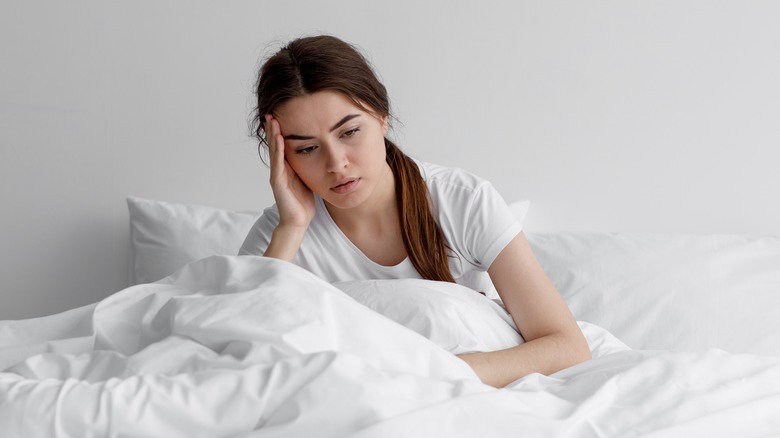Surprising Side Effects Of Lying In Bed Too Much
The CDC recommends at least 7 hours of sleep per night for American adults (i.e. just under one-third of every day). In fact, the average American is sleeping slightly less than that, according to the most recent Gallup Poll on the topic (2013). Yet, as it turns out, the average American spends up to half their life in bed, as a survey conducted by OnePoll on behalf of Slumber Cloud several years ago revealed (via SWNS Digital). And for the avoidance of doubt, by "lying in bed," we mean not only the time that we spend in bed sleeping, but also the time that we spend in bed not sleeping. That includes relaxing, watching television, eating (whether breakfast or otherwise), feeding a baby, writing in a journal, engaging in sexual activity, recovering from flu, following a doctor's bed-rest orders, and so on.
Does this mean Americans are spending too much time lying in bed? That depends upon your definition of "too much." According to UNC Health Talk and Healthline, for optimal sleep hygiene, it's best to limit the use of one's bed to sleep and sex. Accordingly, if you're spending a lot of time lying in bed outside of those activities, then it could be too much. And that is associated with a number of negative physical and mental health consequences — or in the case of those for whom bed rest is medically required, side effects, according to the National Library of Medicine archives.
Spending too much time in bed could lead to spending too much time on the toilet
If you've recently delivered a baby or ever had any sort of surgery requiring general anesthesia, then feel free to skip this one, because there's a really good chance that you're already well aware that lying in bed for prolonged periods is associated with constipation. And by prolonged periods, we mean literally any length of time outside of the ordinary seven or so hours per night that the CDC recommends, because that's really all it takes for constipation to set in as a result of inactivity, according to Merck Manual.
The reason is that our bodies are designed to slow digestion when we're at rest, whether or not we're sleeping. As soon as we cease to be upright, digestive waste that is already present in our system begins slowing its passage through the intestines toward their inevitable exit. In fact, this is the reason we don't often wake up in the middle of the night with the urge to relieve ourselves, according to Massachusetts gastroenterologist Dr. Kyle Staller (via Glamour).
For those confined to bed rest, Merck recommends increasing consumption of fluids and fiber and using stool softeners or laxatives, if prescribed. For those who voluntarily spend a lot of time lying around in bed, well, now you know why you've been feeling a little irregular lately. Here is when to see a doctor about your constipation.
Two ways that spending too much time in bed may lead to weight gain
If you're spending too much time lying in bed, then you not be spending enough time moving around and burning calories. And as much as people seem to enjoy debating whether weight loss is, in fact, the result of fewer calories consumed than calories burned, the notion of "calories in, calories out" is well-established scientific fact, according to Precision Nutrition. According to the medical professionals at Urology of Virginia, to the extent that the time that you're spending lying in bed is standing in for time that you would otherwise be spending engaged in the sort of day-to-day physical activities that are normal for you (and for which your eating habits ideally account for), you're going to store the excess energy as fat, which can lead to weight gain.
Spending too much time in bed can also lead to weight gain by interfering with what's considered normal sleep hygiene, according to Healthline and many others who advise using your bed only for sleep and sex. Just as good sleep habits can lead to good sleep (via CDC), problematic sleep habits — like making your bed your workspace on your remote workdays, for example — can lead to troubled sleep. And troubled sleep may leave you feeling hungrier, even if your energy requirements have not increased, according to Scientific American. Conversely, getting enough sleep may actually reduce cravings during the daytime hours.
Too much lying in bed can wreak metabolic havoc on your body
If spending too much time lying in bed isn't such a good thing for your eating and sleep habits, then it's not going to be such a good thing both for your metabolism and your metabolic health, the two being distinct terms. By "metabolism," we mean the rate at which our bodies burn the calories we consume. By "metabolic health," we're referring to how well our bodies are equipped overall to convert the foods and beverages that make up our daily diet into energy.
Spending too much time in bed literally decreases the rate at which we burn calories, so there's no question: It is slowing your metabolism, at least for the time in which you're lying in bed, per Urology of Virginia. In terms of metabolic health, spending too much time lying in bed has been shown to negatively interfere with insulin sensitivity, according to a 2016 study published by the American Diabetes Association. Insulin sensitivity is what allows the cells of the body to utilize blood sugar effectively. Decreased insulin sensitivity (a.k.a. insulin resistance) makes it more challenging for the body to process blood sugar, which can lead to type 2 diabetes, according to Medical News Today. Type 2 diabetes is a metabolic health disorder in which there is too much sugar circulating in the blood.
Staying in bed all day can cause nighttime sleep issues/circadian rhythm disorders
"In my experience, limiting the amount of time spent in bed is one of the most effective techniques insomniacs can use to improve their sleep," said insomnia coach Martin Reed, writing for Health Central in 2018. A groundbreaking 2020 study published by the Sleep Research Society confirms that Reed's advice was spot on, which is to say that if you have insomnia, you might want to look into how much time you're spending in bed outside of sleeping (and sex).
For the 2020 study, the researchers were already aware that restricting sleep-time is an effective treatment for insomnia. What they wanted to find out was why. To wit, they had a hunch that restricting sleep works because it tends to reduce the amount of time spent in bed. To test that hypothesis, the researchers randomized 56 insomnia sufferers into one of two groups.
Insomnia in the first group was treated with "sleep restriction therapy," for which restricting the amount of time actually spent in bed is fundamental. For the second group, insomnia was treated with "time in bed regularization," in which reduced time in bed is prescribed, but with no associated restrictions. As it turned out, the researchers' hypothesis was spot on, which is to say that restricting time spent in bed reduced the severity of insomnia symptoms.
The complicated relationship between staying in bed too much and depression
People on doctor-ordered bed rest are more likely to develop depression than who haven't been ordered to spend their days in bed, according to Merck Manual. This phenomenon may be attributable to decreased contact with others and to feelings of helplessness. But can spending too much time in bed be a set-up for depression in people who are not confined to bed rest (i.e., those who are not helpless to choose whether to spend prolonged periods of time lying in bed, and yet choose to do so anyway)? A 1994 study published in Acta Physiologica would appear to suggest that it can.
"In order to evaluate the effect of immobilization during bed rest on mental health, we performed psychosomatic investigations of 6 young males and 3 young females before, during and after 20 days bed rest," the authors wrote. What the researchers found was that the subjects "displayed a tendency to development of depression," but that the tendency had disappeared by two months after the bed rest period of the study concluded. Although it was a small study, it nevertheless suggested to the study authors that further investigation is warranted regarding the relationship between depression and lying in bed for prolonged periods. In any case, spending prolonged periods lying in bed may contribute to or exacerbate depression symptoms to the extent that doing so may lead to insomnia, according to Johns Hopkins Medicine.
Spending too much time in bed could change your body fat ratio
It should be somewhat clear by now that spending too much time lying in bed can create a number of health issues, many of which relate in some way to one's size. In keeping with that theme, but upping the ante slightly, it seems that too much lying in bed can actually alter your body fat ratio — for the worse. According to Dr. Douglas Paddon-Jones, a professor at University of Texas Medical Branch, "when a person is restricted to bed rest, even for a few days, they typically lose muscle and gain fat."
Moreover, traditional dietary changes hadn't proven to be useful in offsetting this phenomenon. "Simply eating more food and protein may help protect muscle but will likely increase body fat," Dr. Paddon-Jones explained. "Conversely, eating less food may help avoid fat gain, but will accelerate muscle loss." To find a way around this for those who are actually confined to their beds, Dr. Paddon-Jones and a team of researchers explored whether different forms of protein might be beneficial for a 2019 study published in Journals of Gerontology.
Studying volunteers willing to undergo seven days of bed rest in the interest of science, the researchers found that those who consumed their protein exclusively in the form of whey kept more of their muscle mass, and actually lost some body fat. They also recovered their strength more quickly after the bed rest study period was completed.
You could lose bone mass if you spend too much time in bed
As if losing fat and gaining muscle weren't bad enough, it turns out that lying around in bed for prolonged periods has long been associated with bone loss, per a 1983 study published in Clinical Science. For that study, the researchers collected data on 34 patients, ages 18 to 60, all of whom had been prescribed bed rest in connection with what they described as "low backache due to protrusion of a lumbar intervertebral disc." Each patient's bone mineral density was measured three times: at the outset, after bed rest, and about 15 weeks later.
What the researchers found was that a mere seven days of bedrest led to a mean decrease in bone mineral density of nearly 1%. Of course, if you're not on bed rest, then it might take months and months before you'd be able to say you spent a total of 168 hours of lying around in bed (while not sleeping or having sex), and it wouldn't be consecutively, which could make a difference. Nevertheless, to the extent that the time you're spending in bed is time you could have otherwise spent engaging in weight-bearing exercise (which is known to help preserve bone mass), it's probably too much time.
How spending too much time lying in bed can increase your risk of heart attack
Hopefully, none of us will never have to be on bed rest. However, scientists study the effects of bed rest on people, both sick and healthy, partly because doing so may offer some glimpse at the cumulative effects of inactivity. And one of those cumulative effects is a decline in cardiovascular health. While you aren't exponentially increasing your risk of heart attack if you enjoy the occasional lazy day spent lolling around under the duvet, the fact is that spending too much time in bed isn't doing any favors for your heart and respiratory system, according to a 2014 study published in the European Journal of Epidemiology.
What the researchers discovered is that those who were determined to have spent the least amount of time lying around in bed were less likely to have died from cardiovascular disease than the others over a 12-year period. Those who spent what the authors deemed "excessive hours lying down per day" were statistically much more likely to do so — even among those who were otherwise physically active. Moreover, this particular study may be viewed as quite persuasive because it followed more than 39,000 adults, ages 20-70, participating in the Trøndelag Health Study, which compiled questionnaire data with subject health records. On the other hand, it only included Norwegian nationals and relied upon subjectively reported data.
Prolonged periods of lying in bed may lead to deep vein thrombosis (DVT)
Another possible side effect of spending too much time in bed is deep vein thrombosis (DVT). "When the legs are not being used, blood moves more slowly from the leg veins to the heart," according to Merck Manual. "Blood clots are more likely to form in this slow-moving blood."
A blood clot of this kind is known as DVT, and it may cause discomfort (swelling, pain). But even if it doesn't cause any immediate discomfort, it could nevertheless break free and travel to the lungs, where it could block a blood vessel (i.e. pulmonary embolism), according to the Mayo Clinic. This is, as it probably sounds, a potentially life-threatening scenario.
With a side effect so serious, the logical question, of course, is to what extent must one worry that a lazy day spent lying in bed might result in one's serious illness or death. Unfortunately, the answer is that it depends on the individual. According to the UK NHS, the risk factors for DVT include (in addition to a prolonged period of inactivity that may be as brief as a surgery or an airplane trip) being overweight or obese, having a prior or family history, the existence of blood vessel damage, taking a medication that may increase your risk of blood clots, being pregnant (because it increases your risk of blood clots), or having any health condition that may accelerate blood clotting.
Prolonged stays in bed may increase pneumonia risk
Spending too much time lying in bed can cause pneumonia, albeit only to the extent that it involves lying in one position for an extended period — especially on one's back, which may allow germs to settle in the lungs along with mucous and other secretions (via the Cleveland Clinic). Pneumonia is an infection that causes the air sacs in the lungs to become inflamed, as a result of which they may fill with pus and other fluids (via the American Lung Association). This sort of inflammation and related congestion can cause a number of symptoms, but most notably, fever, chills, coughing and shortness of breath. At its most serious, pneumonia may cause acute respiratory distress, and in some cases, death.
That being said, those at the highest risk for pneumonia include the elderly (those over age 65), the very young (under age 2), those with autoimmune conditions, and those with health conditions that affect the lungs (e.g., asthma, emphysema, and COPD). Also at an elevated risk are smokers and those with diabetes, according to a 2021 study published in the American Journal of Translational Research, which notes that the longer one spends lying in bed, the greater one's risk of pneumonia will be.
Bedsores are a known risk with prolonged periods of bed rest
We bring up bedsores last of all, because if you're not actually confined to your bed for an extended period, then, statistically, there is little risk of you developing them. Bedsores, also known as pressure sores and pressure ulcers, almost always involve more than merely lying in bed a bit more than one should. Rather, bedsores tend to occur only when someone has been immobilized in one position for days or weeks at a time or longer, according to the Mayo Clinic.
A bedsore is ulcerative damage to the skin that is often caused by prolonged periods of pressure or friction being placed on the skin. Lying in one position for an extended period places constant pressure on weight-bearing body parts, which can decrease circulation to the skin covering those body parts. Reduced circulation means there's less oxygen and nutrients being delivered to the skin, making it more vulnerable to damage/injury, whether by pressure or friction.
Bedsores tend to develop on bonier areas of the body, such as the hips, tailbone, shoulder blades, and along the spine, and they have been known to develop over mere hours or days. But again, that's over hours or days of remaining immobilized in one position. If you ever find yourself in such circumstances, MedlinePlus recommends getting help in changing positions frequently, and no less than every two hours.












